15th CCG VIP Luncheon: Build Resilient Industrial &Supply Chains
July 24 , 2025
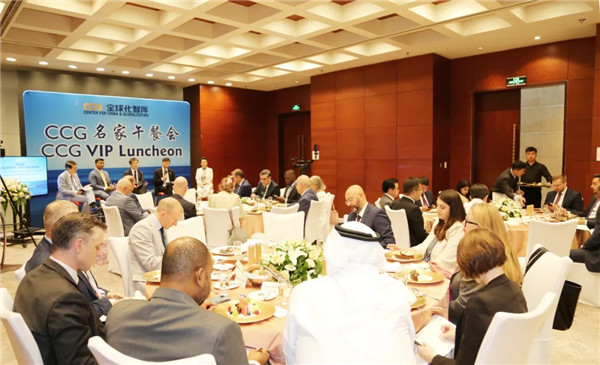
On July 24, 2025, the 15th edition of “CCG VIP Luncheon” was successfully hosted in Beijing. Centered on the theme “Bolstering Trade and Investment to Build Resilient Industrial and Supply Chains Together”, the event aimed to systematically analyze the roots of economic and trade risks, explore pathways for collaboration, and build consensus for action. The event was moderated by CCG President and Former Counsellor of the China State Council Dr. Henry Huiyao WANG, and featured a special panel discussion with ZHAO Ping, President of China Council for the Promotion of International Trade Research Institute; LIN Shunjie, Chairman of China International Exhibition Center Group Corporation; JI Wenhua, Professor at the School of Law of University of International Business and Economics, Researcher at the China WTO Institute, and Former official in the Intellectual Property Division of the Department of Treaty and Law at China’s Ministry of Commerce; and Ravi Agrawal, Editor-in-Chief of Foreign Policy and Former Senior Producer of CNN.
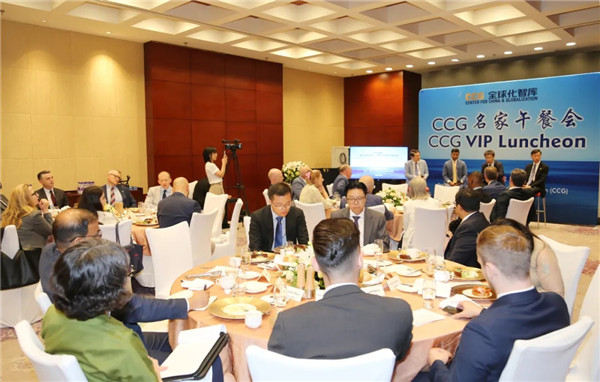
The event attracted the on-site participation of over 50 distinguished figures from political, business, and academic circles, both from China and abroad. Among the attendees were ambassadors to China from nine countries—Barbados, Brazil, Cyprus, the Netherlands, New Zealand, Norway, Pakistan, Spain, and Switzerland—as well as senior diplomats from 13 countries, including Canada, Croatia, the European Union, Hungary, India, Kazakhstan, Latvia, Malta, Pakistan, Romania, Turkey, the United Arab Emirates, and the United States. The event also welcomed heads of international organizations based in China, executives from multinational companies, and prominent media professionals from both domestic and international outlets.
The global economic recovery is progressing unevenly. A resurgence of trade protectionism, escalating geopolitical conflicts, and intensifying competition for critical resources are converging to undermine the stability and security of industrial and supply chains worldwide. Frequent supply—chain disruptions, heightened exposure to technology choke points, and increasingly fragmented market channels have made it clear that reliance on traditional single‑track models can no longer cope with today’s complex uncertainties. Against this backdrop, leveraging trade and investment cooperation to reinforce industrial and supply—chain resilience is not only a pragmatic response to the current economic predicament but also a long—term strategy for upgrading the international division of labor.
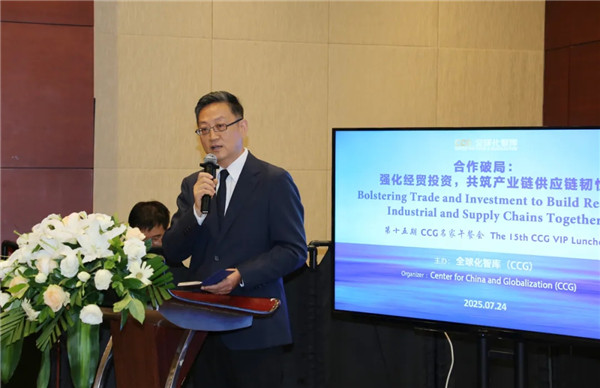
The welcome address of the luncheon were moderated by Zhang Wei, Deputy Secretary-General of CCG. He began by extending a warm welcome to all distinguished guests from various sectors attending the CCG VIP Luncheon. He emphasized that the event centers on key issues such as strengthening trade and investment and building resilient industrial and supply chains. He expressed his anticipation for the keynote speakers to share their valuable insights, believing that their expertise and profound perspectives would greatly enrich the discussion and contribute meaningfully to the event.
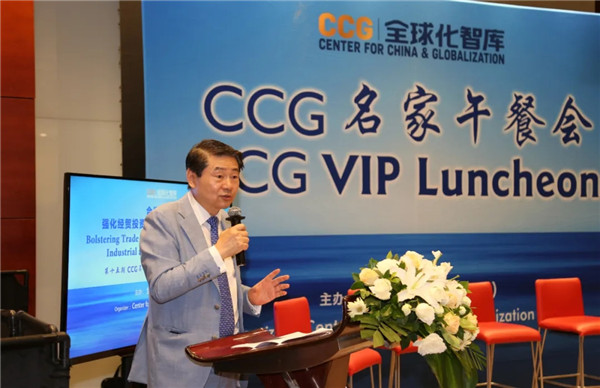
Dr. Henry Huiyao WANG, President of CCG and Former Counsellor of the China State Council, warmly welcomed ambassadors and guests. He noted that “CCG VIP Luncheon” series has become a key platform for promoting multilateral dialogue and cooperation. Against the backdrop of global uncertainty, the theme of bolstering trade and investment to build resilient industrial and supply chains together is highly relevant. He expressed hope that the insights of leading figures from government, academia, business, and media would bring fresh momentum to global collaboration and mutual trust.
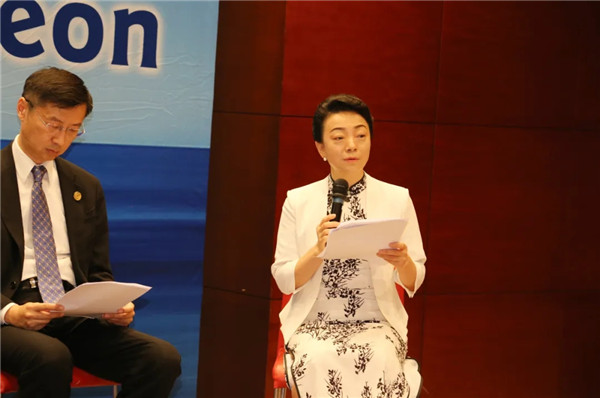
At the panel discussion, ZHAO Ping, President of China Council for the Promotion of International Trade Research Institute, outlined the Global Supply Chain Promotion Report and shared insights on current trends, challenges, and improvement paths. She noted growing momentum in connectivity, rules, technology, and finance, but highlighted resilience as a key weakness. She called for joint efforts to enhance infrastructure, promote inclusive rules, and facilitate flows of technology and capital to ensure stable, secure, and high-quality supply chain development.
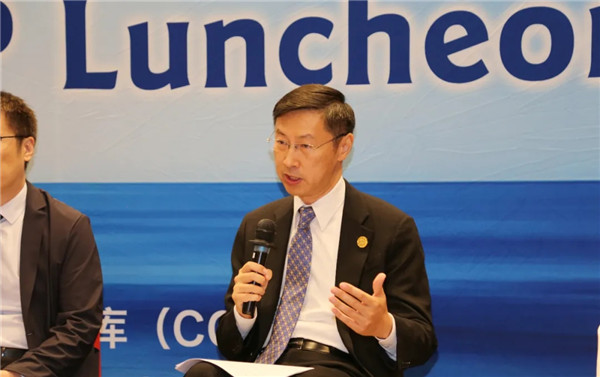
LIN Shunjie, Chairman of China International Exhibition Center Group Corporation, said that despite global uncertainties, supply chain cooperation remains a priority. The China International Supply Chain Expo has become a key platform for fostering collaboration and building an open, resilient, and diverse supply chain ecosystem. Broad participation reflects a shared commitment to deeper international cooperation.
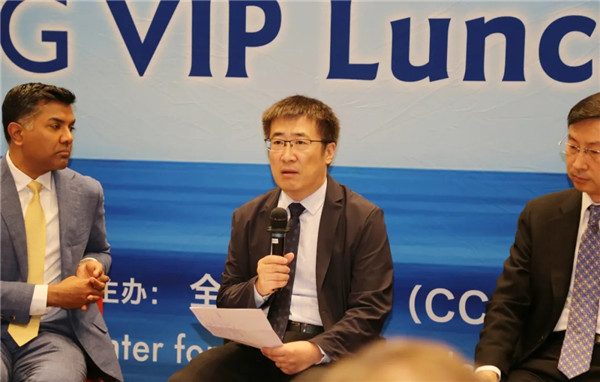
JI Wenhua, Professor at the School of Law of University of International Business and Economics, Researcher at the China WTO Institute, and Former official in the Intellectual Property Division of the Department of Treaty and Law at China’s Ministry of Commerce, noted that global supply chains face great power rivalry, geopolitical conflicts, and challenges. Countries’ policies fall into unilateral restrictions, regional agreements, and global coordination. While stabilizing locally, these measures increase fragmentation and uncertainty globally. He stressed the need for responsible nations to uphold multilateral rules, enhance cooperation, and promote supply chain security and sustainability.
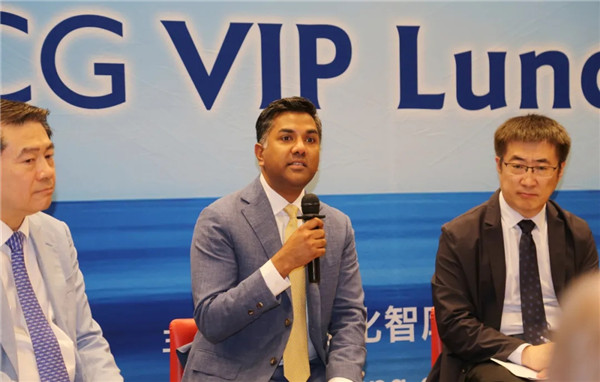
Ravi Agrawal, Editor-in-Chief of Foreign Policy and Former Senior Producer of CNN, noted that globalization has spurred inequality and protectionism. The pandemic revealed supply chain vulnerabilities, driving nearshoring efforts. Amid climate and demographic challenges, global tensions—especially between the U.S. and China—strain trade. He urged major powers to support developing countries in capacity building, technology sharing, and green energy to foster economic transformation and rebuild trust.
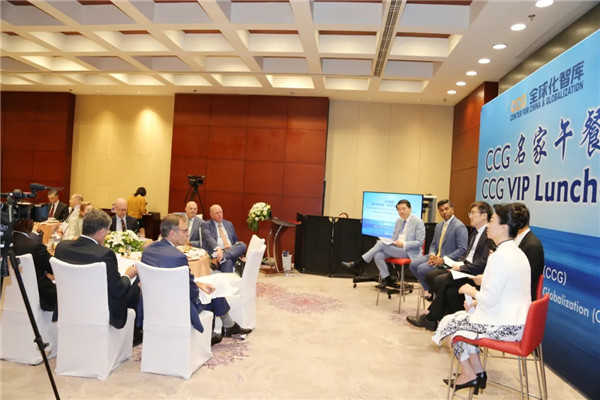
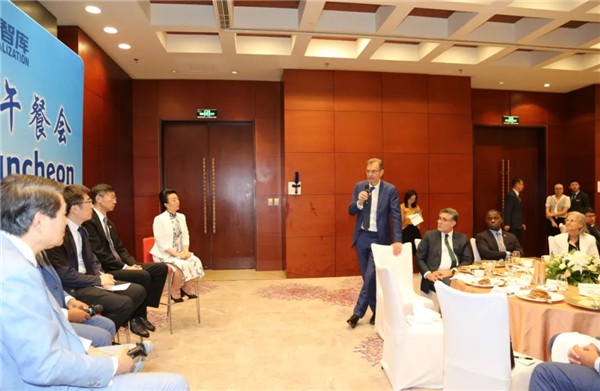
During the Q&A, participants actively discussed ensuring rule compliance and building broad consensus. The four speakers offered valuable insights, inspiring deep reflection. The event provided a key platform for dialogue and practical guidance for policymakers, businesses, and scholars. It concluded in a constructive atmosphere, with consensus on its positive and lasting impact.
Participants:
Ambassadors (in alphabetical order of countries):
H.E. Hallam Henry, Ambassador of Barbados to China
H.E. Marcos Galvão, Ambassador of Brazil to China
H.E. Frances Galatia Lanitou Williams, Ambassador of Cyprus to China
H.E. André Haspels, Ambassador of Netherlands to China
H.E. Jonathan Austin, Ambassador of New Zealand to China
H.E. Vebjørn Dysvik, Ambassador of Norway to China
H.E. Khalil ur Rahman Hashmi, Ambassador of Pakistan to China
H.E. Marta Betanzos Roig, Ambassador of Spain to China
H.E. Jürg Burri, Ambassador of Switzerland to China
Diplomatic Representatives (in alphabetical order of countries):
lan Medcalf, Counsellor of Trade Policy, Embassy of Canada
Arna Ferreira, Minister of the Embassy, Embassy Croatia
Klaudia Feurle, Trade Affairs Manager, EU Delegation
David Sipos, Third Secretary, Embassy of Hungary
Gautam Kumar Pandey, Head of Trade & Commerce Wing, Embassy of India
Yermanov Kaiyrzhan, Counselor, Embassy of Kazakhstan
Egils Leimanis, Charge d’Affairs, Embassy of Republic of Latvia
Kimberly Zammit, Deputy Head of Mission, Embassy of the Republic of Malta
Rabbia Nasir, First Secretary, Embassy of Pakistan
Ștefan-Marius Tudoran, Third Secretary, Political Section, Embassy of Romania
Atakan Ozdemir, Chief Commercial Counselor, Embassy of Turkey
Saeed Alghfeli, Head of Economic Affairs, Embassy of UAE
Zhang Xiao, the Economic Researcher of Economic Affairs Section, UAE Embassy in Beijing
Julian Sutcliffe, Head of Multilateral Trade Policy, Embassy of United Kingdom
Paul Stempel, Trade Officer, First Secretary, Strategic Industries and Trade Unit, Embassy of United States
Rachael Chen, Spokesperson, Embassy of United States
International Organizations (in alphabetical order of organizations)
Hamadou Modibo Dicko, Deputy Representative, UNICEF
Enterprise Representatives (in alphabetical order of organizations):
GAO Yong, Vice President, Bayer
GAO Min, Head of Government Affairs, Bingbo China
ZHANG Jixing, Deputy Director of the Exhibition Economy Research Department, China Council for the Promotion of International Trade
CHENG Weishu, International Cooperation Manager, Douyin Group
Patrick Zhang, Global Head of Technology Policy and Law, ByteDance
Andre Yu, Business Executive Analyst, Eni S.p.A
Jason Chen, Specialist, Central Government Affairs Team, MSD China
PENG Ye, Director of Government Affairs, Procter & Gamble Greater China
QIU Yang, President, Royal Bank of Canada Beijing
DENG Ya, CEO, Tianshou Intelligent Robot
WU Huangsen, Senior Representative, NEO
Representatives from CGTN, China Daily, Chora Media, and South China Morning Post also attended.






